On 7 August 2014, Russia imposed a boycott on all fruit and vegetables from the EU, United States, Australia, Canada and Norway. Ten years later, we are looking back with some exporters. What do they remember most about the start of the Russian embargo? How big was the impact, and will Russia ever again become an important export market?
"We had stopped trading to Russia altogether shortly before the boycott started, so we were very relieved that we were not doing business to Russia at that time," reflects Bart Leegwater of trading company Paul Leegwater. "So the impact was quite minor for us. We did expect more competition on other countries, but it turned out to be better than expected."
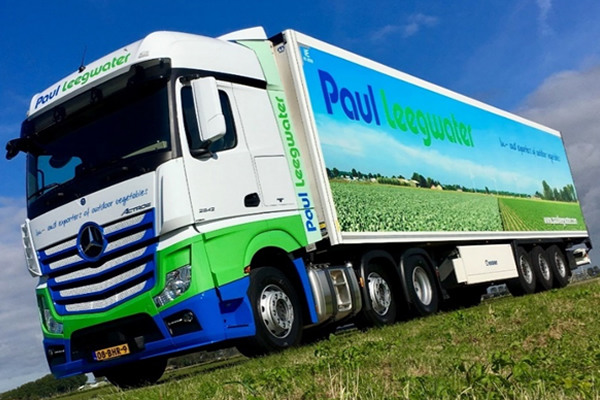
Top fruit trader Paul Peters had no large amounts outstanding at the start of the boycott either. "However, our turnover did go down. At first, the impact seemed big, but because other doors opened again towards supermarkets and other countries, it still turned out to be a good year for us."
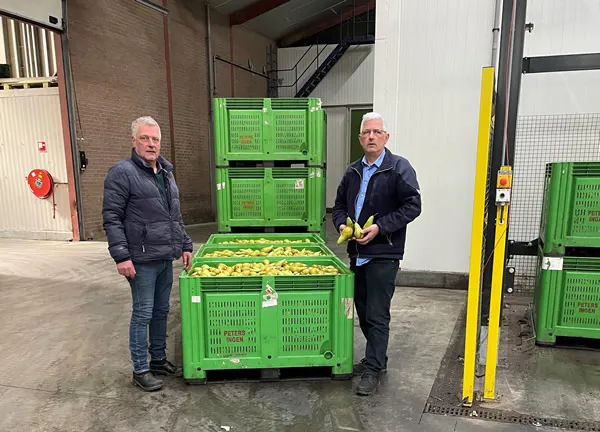
Kees and Paul Peters.
Asked whether Bart still hopes that Russia will become an important export market in the future, he replied, "I do have high hopes for that. Should there eventually be solutions and the borders reopen, I think there will be a lot of opportunities for exports." Paul Peters also hopes for renewed exports. "For sales, but also certainly for peace in the world."
Indifferent politics
In Belgian trade, on the other hand, there was a bit more panic, indicates Jeroen Buyck of Calsa. Looking back at the moment the boycott was imposed, he realised right away that it was going to have a big impact. "I remember the moment I heard the news, and the slight panic that came with it, in the whole sector," he explains. "At that time, we were already used to something in exports to Russia; even before the boycott we had already had to deal with problems with the rouble, the closure of the Stupinskiy market or the EHEC crisis, each time seriously disrupting the Russian import market. Yet we knew this situation could be of a different magnitude. One would hope at the time that this would be temporary. But at the same time, one would start looking diligently for alternatives."
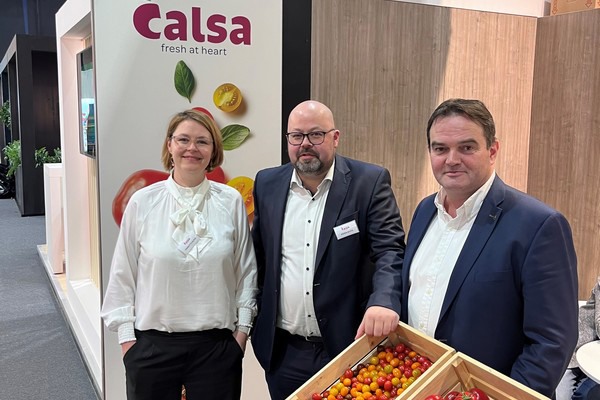
Charlotte, Jeroen Buyck and Pol Dendauw of Calsa
"Calsa had just made a substantial investment with a new warehouse, mainly to accommodate growth towards Russia, and all of a sudden those sales were completely jeopardised. At that time, we went to certain politicians with several colleagues, but that didn't help at all. It also struck me then how indifferent politicians were to this problem, and how they even thought we had created this problem ourselves by selling so much in the same country. They felt we had made ourselves too dependent on the Russians. Which, of course, was nonsense. It was the free market that determined that there was much demand in the former Eastern Bloc countries."
And because Russia was such an important partner, the trader saw a huge impact in the early days. "More than half of our sales went to Russia. A large part of our organisation was built on it. And we were certainly not the only ones. Some of our colleagues had up to 80 per cent or more of their sales going to Russia. All we could do was concentrate on everything non-Russia and try to maximise sales everywhere outside Russia."
"So we completely changed our strategy at that point: instead of distant exports, we completely folded back to the countries around us or closer anyway, mainly France and Germany, but also Poland, Spain, Italy, etc. We worked very hard to get sales off the ground everywhere, and also sought cooperation with some of our colleagues. Fortunately, we succeeded. Now our sales are more than double what they were 10 years back, despite Russia being completely eliminated from our scope."
No comparable market
Tony Derwael of Bel'Export also remembers it all like it was yesterday. "You have those days when you remember exactly what you were doing at that moment. Those are the typical historical events, like 9/11. But in our sector, it was the moment we got the news that the boycott of Russia had been imposed as well. Half of our pears were going to Russia. To lose a customer who buys half overnight, that's a big problem. That did cause a panic. I'll never forget that."
Tony Derwael.
"So the first year did see a sharp dive in prices right away. You then have to look for other markets, but that's not so easy," Tony explains. "The Conference is very tasty, but in countries like the United States or China they want a smooth, bulbous pear. Conference is not that, so finding a new market, like Russia was; we just couldn't find any more. I would venture to say that we still haven't found it. Yet many companies coped by tapping into a range of other markets. We, too, saw that Germany, for example, became a very big customer in the following years. We 'got' that one, so to speak, because more than half of Italian Abate Fetel production went away. The Conference is an excellent replacement for this, being similar in shape and flavour, which allowed us to step in nicely."
Not quick resolution expected
Looking to the future, both Belgian traders therefore do not see a return to the Russian market any time soon. "It will be determined by politics," Jeroen continues. "If the boycott ends, certain products will probably find their way there quite smoothly again, and I am thinking mainly of Conference pears. But for other products, like most vegetables, this market will never again be as it was before. For lettuces, peppers or tomatoes, European positions have meanwhile been taken by other countries, such as Morocco, Iran, China, etc. Over the years, the quality of produce from those countries has also improved tremendously, so we can make less of a difference in that area. These growers won't give up their position easily either."
"But in fact, I especially don't believe this will get resolved politically any time soon. We are again experiencing a (cold) war, and the previous one lasted for about 70 years. Even with an end to the war in Ukraine, we will not go back to business as usual. The political differences have become far too great for that."
Tony concurs: "Indeed, I don't think things will ever be right again. It is simply a new reality that we have to deal with. The willingness of both the US, Europe and Russia is not there to stop the conflict. Tensions are only rising, and other countries have benefited in the meantime. In this case, it would be Turkey, which has taken a large share of the Russian apple and pear market. They are reaping the benefits, and we will have to look for other solutions."
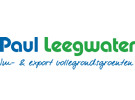 For more information:
For more information:
Bart Leegwater
Paul Leegwater
The Mossel 21
1723 HZ Noord-Scharwoude
T: +31 (0) 226 362 202
M: +31 (0) 651 534 409
Email: bart@paulleegwater.com
www.paul leegwater.com 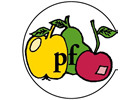 Paul Peters
Paul Peters
Peters Brothers Fruit Trade
Culekampseweg 2
4031 JG Ingen
Mob: 06 51 11 13 17
info@petersfruithandel.nl
Jeroen Buyck
Calsa
Roeselaarsestraat 9b
8850 Ardooie, Belgium
+32(0) 51 74 73 74
info@calsa.be
www.calsa.be
Tony Derwael
Bel'Export
Neremstraat 2
3840 Borgloon - Belgium
Tel +32 12 440 551
belexport@belexport.com
www.belexport.com
